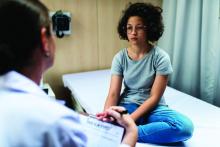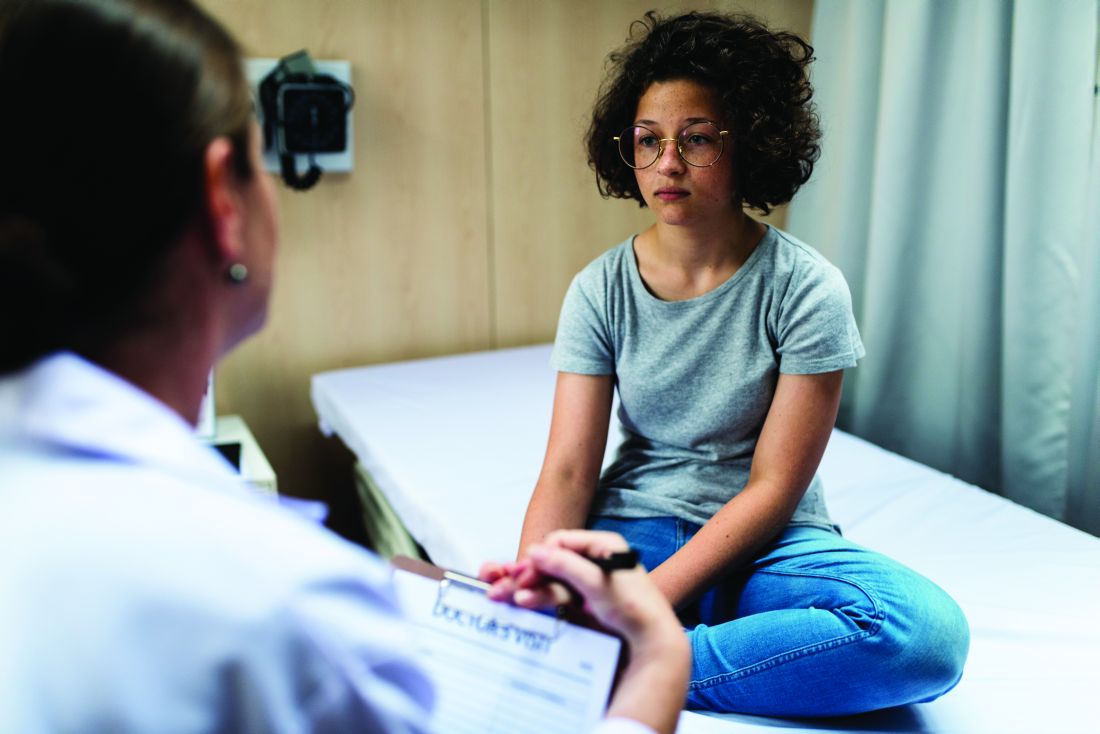User login
TORONTO – Almost half of adolescents (45%) reported that their primary care providers (PCPs) do not routinely ask them about sex, and only 13% report they’ve been offered screening for sexually transmitted infections (STIs), according to a survey study presented at the Pediatric Academic Societies meeting.
And it appears the teenagers aren’t even listening to much of what their parents are saying on the subject: The survey also found that 90% of parents reported that they talk to their adolescents about sex, but only 39% of adolescents reported the same.
Regarding the discrepancy between the parents’ and adolescents’ responses, “Our best guess is that parents may have mentioned sex with their adolescents at some point, but the conversation was not meaningful enough to register on the adolescents’ radars! That type of discussion is probably best had more than once and in more than one way,”she said in an interview.
The adolescents, aged 13-17 years, and parents of adolescents attending the 2017 Minnesota State Fair were invited to complete an 18-question anonymous survey. The teens were queried whether they had seen a PCP in the last year and asked about their discussions about sexual activity and STIs with their physicians and parents. Parents were asked about their knowledge of discussions the teens had with their PCPs and their own discussions with their children. A total of 582 adolescents and 516 parents completed the survey.
One-quarter of parents who completed the survey felt that PCPs should not discuss sex with their teens.
“I think that primary care physicians have a lot to cover when doing preventive health visits with adolescents, and talking about sex is not necessarily an easy or comfortable thing to do and so may be something that falls to a lower priority. And it certainly doesn’t help if parents are not supportive of the concept of confidential adolescent care,” Dr. Schneider related.
“We were very surprised to see that 25% of parents did not feel that PCPs should be discussing sex with their child. I think that we need to next work on getting the parents on board and building an expectation that adolescents, when visiting their PCP, will have confidential discussions about sexual health,” she said.
TORONTO – Almost half of adolescents (45%) reported that their primary care providers (PCPs) do not routinely ask them about sex, and only 13% report they’ve been offered screening for sexually transmitted infections (STIs), according to a survey study presented at the Pediatric Academic Societies meeting.
And it appears the teenagers aren’t even listening to much of what their parents are saying on the subject: The survey also found that 90% of parents reported that they talk to their adolescents about sex, but only 39% of adolescents reported the same.
Regarding the discrepancy between the parents’ and adolescents’ responses, “Our best guess is that parents may have mentioned sex with their adolescents at some point, but the conversation was not meaningful enough to register on the adolescents’ radars! That type of discussion is probably best had more than once and in more than one way,”she said in an interview.
The adolescents, aged 13-17 years, and parents of adolescents attending the 2017 Minnesota State Fair were invited to complete an 18-question anonymous survey. The teens were queried whether they had seen a PCP in the last year and asked about their discussions about sexual activity and STIs with their physicians and parents. Parents were asked about their knowledge of discussions the teens had with their PCPs and their own discussions with their children. A total of 582 adolescents and 516 parents completed the survey.
One-quarter of parents who completed the survey felt that PCPs should not discuss sex with their teens.
“I think that primary care physicians have a lot to cover when doing preventive health visits with adolescents, and talking about sex is not necessarily an easy or comfortable thing to do and so may be something that falls to a lower priority. And it certainly doesn’t help if parents are not supportive of the concept of confidential adolescent care,” Dr. Schneider related.
“We were very surprised to see that 25% of parents did not feel that PCPs should be discussing sex with their child. I think that we need to next work on getting the parents on board and building an expectation that adolescents, when visiting their PCP, will have confidential discussions about sexual health,” she said.
TORONTO – Almost half of adolescents (45%) reported that their primary care providers (PCPs) do not routinely ask them about sex, and only 13% report they’ve been offered screening for sexually transmitted infections (STIs), according to a survey study presented at the Pediatric Academic Societies meeting.
And it appears the teenagers aren’t even listening to much of what their parents are saying on the subject: The survey also found that 90% of parents reported that they talk to their adolescents about sex, but only 39% of adolescents reported the same.
Regarding the discrepancy between the parents’ and adolescents’ responses, “Our best guess is that parents may have mentioned sex with their adolescents at some point, but the conversation was not meaningful enough to register on the adolescents’ radars! That type of discussion is probably best had more than once and in more than one way,”she said in an interview.
The adolescents, aged 13-17 years, and parents of adolescents attending the 2017 Minnesota State Fair were invited to complete an 18-question anonymous survey. The teens were queried whether they had seen a PCP in the last year and asked about their discussions about sexual activity and STIs with their physicians and parents. Parents were asked about their knowledge of discussions the teens had with their PCPs and their own discussions with their children. A total of 582 adolescents and 516 parents completed the survey.
One-quarter of parents who completed the survey felt that PCPs should not discuss sex with their teens.
“I think that primary care physicians have a lot to cover when doing preventive health visits with adolescents, and talking about sex is not necessarily an easy or comfortable thing to do and so may be something that falls to a lower priority. And it certainly doesn’t help if parents are not supportive of the concept of confidential adolescent care,” Dr. Schneider related.
“We were very surprised to see that 25% of parents did not feel that PCPs should be discussing sex with their child. I think that we need to next work on getting the parents on board and building an expectation that adolescents, when visiting their PCP, will have confidential discussions about sexual health,” she said.
Key clinical point:
Major finding: Of the adolescents who responded to the survey, 45% said their PCPs don’t routinely discuss sex with them, and only 13% reported being offered screening for STIs.
Study details: Survey study including 582 adolescents aged 13-17 years and 516 parents of adolescents.
Disclosures: Dr. Schneider reported no financial conflicts of interest.


